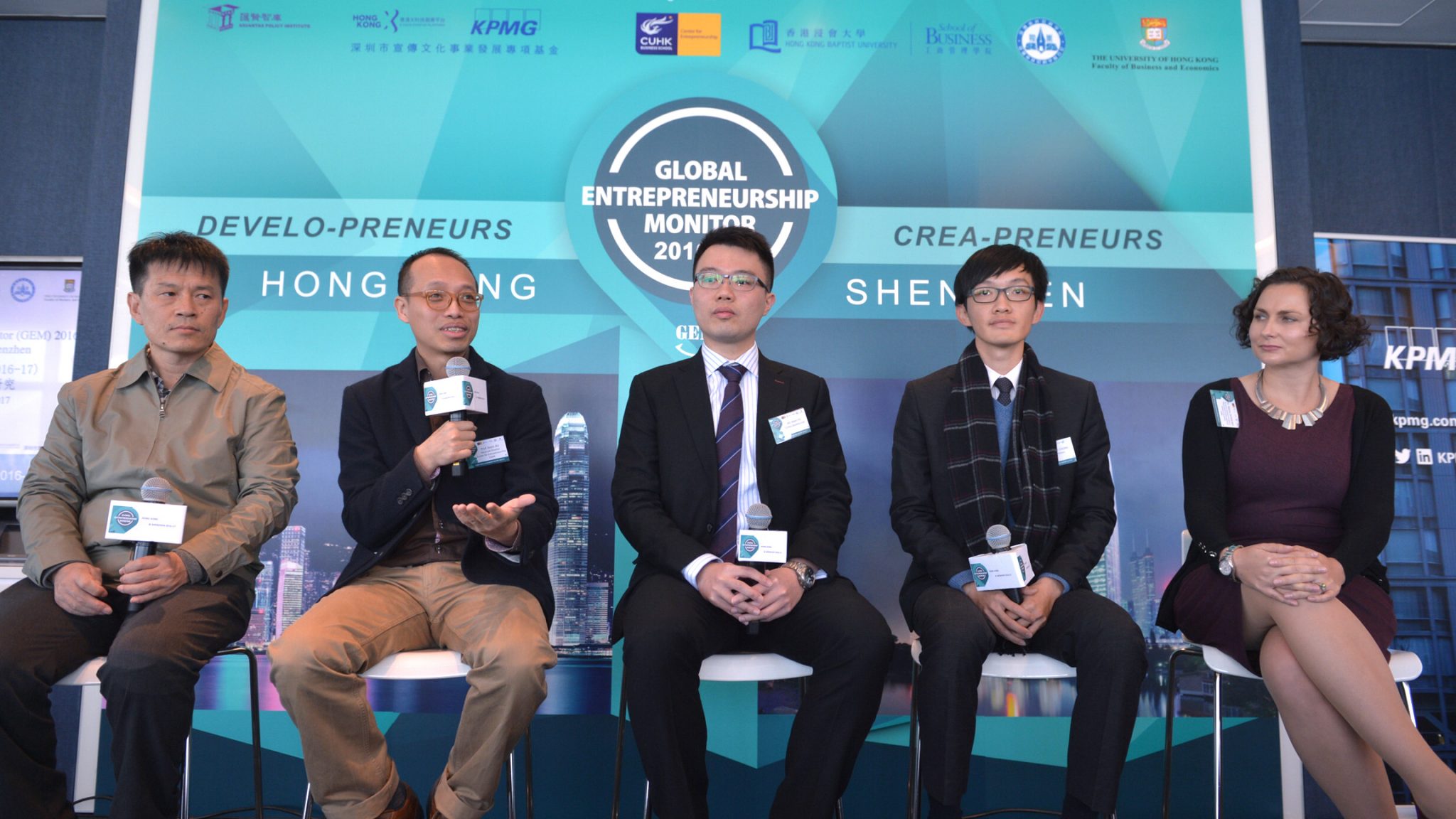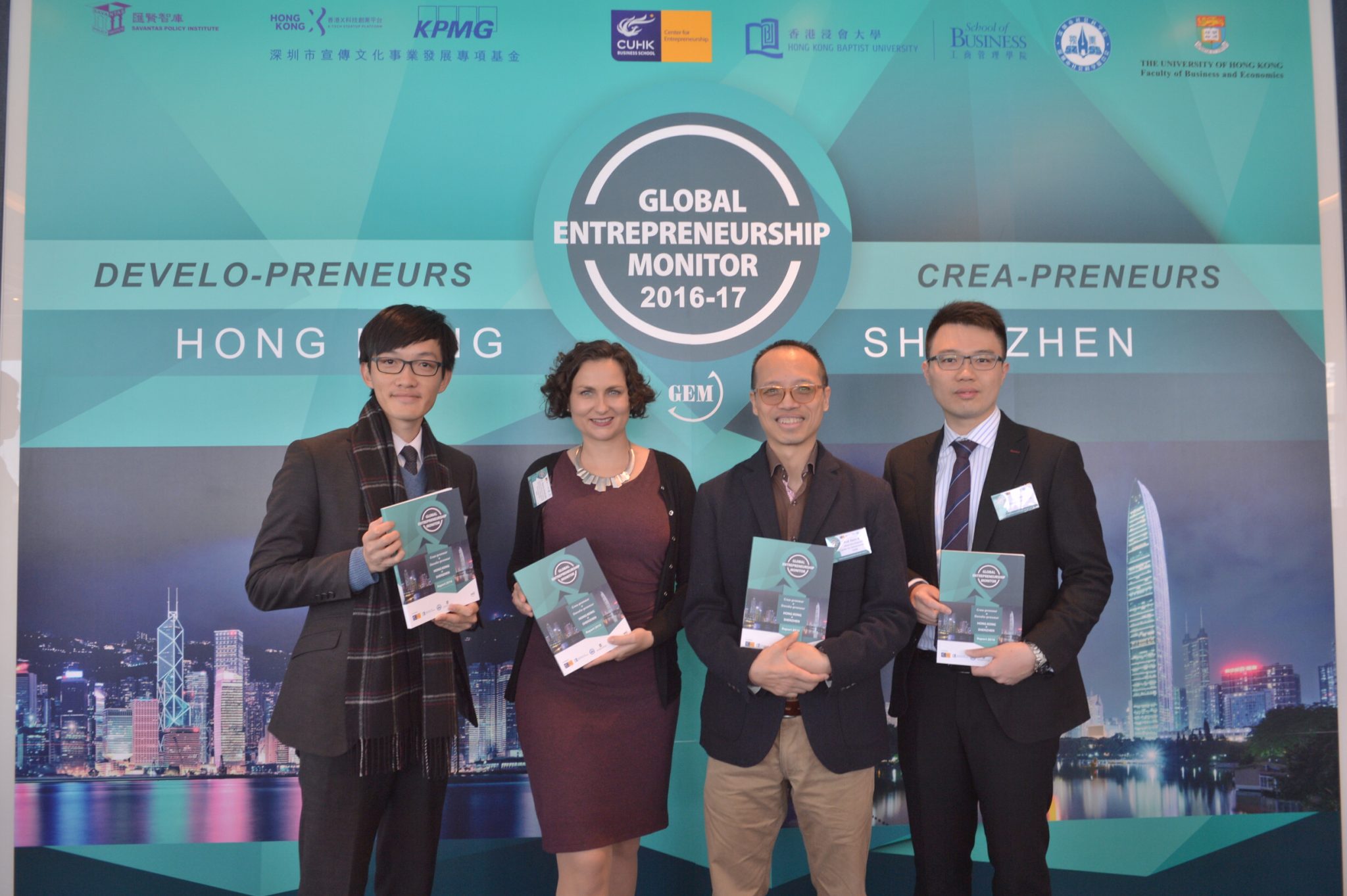Joint Entrepreneurship Study Shows Staggering Increase in Hong Kong and Shenzhen Entrepreneurial Activities

Experts advocate the two cities join force in formation of complementary advantages to foster international competitiveness.
New research released today by the professors of The Chinese University of Hong Kong (CUHK) Business School’s Centre for Entrepreneurship (CfE) and Hong Kong Baptist University (HKBU)’s School of Business shows that entrepreneurship in Hong Kong and Shenzhen is on the rise.
A collaborative effort by CUHK CfE, HKBU School of Business, the University of Hong Kong’s Faculty of Business and Economics, Shenzhen Academy of Social Science and Savantas Policy Research Institute, the research titled “Global Entrepreneurship Monitor (GEM) Hong Kong and Shenzhen Report 2016-17” provides a detailed analysis of the current status of entrepreneurship in Hong Kong and Shenzhen. The study compares the results with past indicators for both ecosystems and provides an international benchmark with 65 economies worldwide. It is part of the global initiative, Global Entrepreneurship Monitor (GEM), the world’s foremost comparative entrepreneurship study and a trusted resource on entrepreneurship for key international organizations such as the United Nations, World Economic Forum, World Bank and more.
In the recent few years, Hong Kong and Shenzhen have experienced an explosive growth in the start-up support ecosystem. The GEM Hong Kong and Shenzhen Report 2016-17 shows that the start-up rates recorded a staggering increase in Hong Kong and Shenzhen from 2009 to 2016. In mid-2016, the early-stage entrepreneurial activity among the adult population was estimated at 9.44 percent (3.64 percent in 2009) in Hong Kong and 16.04 percent (4.8 percent in 2009) in Shenzhen. The growth has been driven by a rapid increase in Shenzhen’s new* (+284 percent) and Hong Kong’s growth in nascent** businesses (+206 percent) in comparison with 2009 statistics. The prevalence rates of established businesses recorded an increase as well: +389 percent for Shenzhen and +109 percent for Hong Kong. It is worth noting that while entrepreneurship rates are on the rise in Hong Kong and Shenzhen, they are declining in other places in China. Both cities have developed a separate start-up culture and entrepreneurial ecosystem that operate independently from the rest of the Mainland.
The positive changes were not limited to early entrepreneurship rates only. The research team also observed a major shift in attitudes and entrepreneurial intentions. In particular, 56.8 percent of the adult population perceives start-up opportunities in Hong Kong. In Shenzhen, the same proportion of individuals who declared they possessed necessary skills and knowledge to start a new business (35.8 percent), also reported their intention to start a business in the next two years (36 percent). Comparing to 2009, the population with entrepreneurial intentions in Hong Kong grew from 7.3 percent to 19.7 percent in 2016, representing an impressive increase of +170 percent. Similarly, in Shenzhen the intentions grew from 17.6 percent to 36 percent, an increase of +105 percent. According to the study, cultural conditioning and attitudes towards entrepreneurship, perception of own skills, and exposure to entrepreneurship practices all had a positive impact on intentions to start businesses. Successful entrepreneurs are also regaining their high status and are promoted by local media in Shenzhen and Hong Kong.
In terms of financial support, Hong Kong early-stage firms have lower capital requirements than that of their Shenzhen counterparts, which may be related to the lower technological intensity of Hong Kong firms. 92 percent of nascent entrepreneurs in the two cities declared that their principal source of financial support was their own savings. The role of the family in financing new ventures is still significant in Shenzhen, but not so much in Hong Kong. Banks are also more supportive of startups in Shenzhen than in Hong Kong and so are venture capitalists, which could be explained by a higher prevalence of start-ups with profound market impact. In Hong Kong, on the other hand, crowdfunding is more prevalent as the source of capital for early-stage businesses, a sign of a more established product innovation.
Aligned with higher entrepreneurship rates, the research team also found a growing culture of informal investors developing in both cities. Shenzhen observed a much higher informal investment prevalence rate (20.5 percent) than Hong Kong (6.5 percent) of the adult population. In fact, Hong Kong and Shenzhen informal investors were two of the most generous among all economies in the study with a contribution of US$70,565 and US$76,112 respectively. The study has also recorded a dramatic change in investment patterns for Shenzhen. While in 2009 individuals were rather investing in family members, in 2016, friends and neighbours had been the first choice which was aligned with that of Hong Kong.
In addition, the research team interviewed 39 Hong Kong and 37 Shenzhen experts in the field of entrepreneurship about their opinions on how the cooperation between Hong Kong and Shenzhen that would increase the cities’ international competitiveness. The most frequent recommendation was to leverage the natural industry compatibilities between Hong Kong and Shenzhen. Other recommendations include:
- Joint development of industries such as Internet-of-Things, Smart City, Health Tech, Edu Tech, Fintech or E-commerce
- Joint R&D initiatives aiming at cross-border innovation, sharing of talents and intensification of knowledge exchange
- Introduction of joint or cross-border education to develop a shared cultural understanding of each other through opening more world-class academic institutions catering to students from both sides of the border
- Coordinating government policies for entrepreneurship between the two economies, e.g. joint visas for entrepreneurs that would facilitate cross-border operations of many start-ups
Prof. Kevin Au, Associate Director of CUHK CfE and Associate Professor of Department of Management at CUHK Business School, says: “If Hong Kong and Shenzhen join forces in the formation of complementary advantages on entrepreneurship, it would strengthen the international and Mainland competitiveness for both. This can be the first step towards the development of the Hong Kong-Shenzhen megalopolis.”
Dr. Marta K. Dowejko, Research Assistant Professor in Entrepreneurship of the Department of Management at HKBU School of Business, says: “Hong Kong and Shenzhen are facing a fantastic opportunity: that of being in the perfect position to build a highly unique and internationally competitive start-up hub with an unparalleled ecosystem compatibility between the two cities and a supportive informal investment culture. While Shenzhen’s start-ups are well geared to deliver innovative ideas with high growth potential, Hong Kong’s entrepreneurs possess the know-how in taking ideas to the next level and ensuring their long-term sustainability. The results from this year’s GEM report give testament to this unique setup that no other place in the world has.”
* 3 to 42 months old businesses
** in the process of starting up, less than three months old
For other findings, please visit: https://goo.gl/zGfznP to read the full report, and please download the PowerPoint slides from: https://goo.gl/S4qB44 for reference.

From right to left: Dr. Allen Yu, Co-Founder and Genetic Scientist of CodeX Genetics; Prof. Kevin Au, Associate Director of CUHK CfE and Associate Professor of Department of Management at CUHK Business School; Dr. Marta K. Dowejko, Research Assistant Professor in Entrepreneurship of the Department of Management at HKBU School of Business; and Mr. Sam Chong, Founder of Easy Green

Prof. Kevin Au, Associate Director of CUHK CfE and Associate Professor of Department of Management at CUHK Business School

